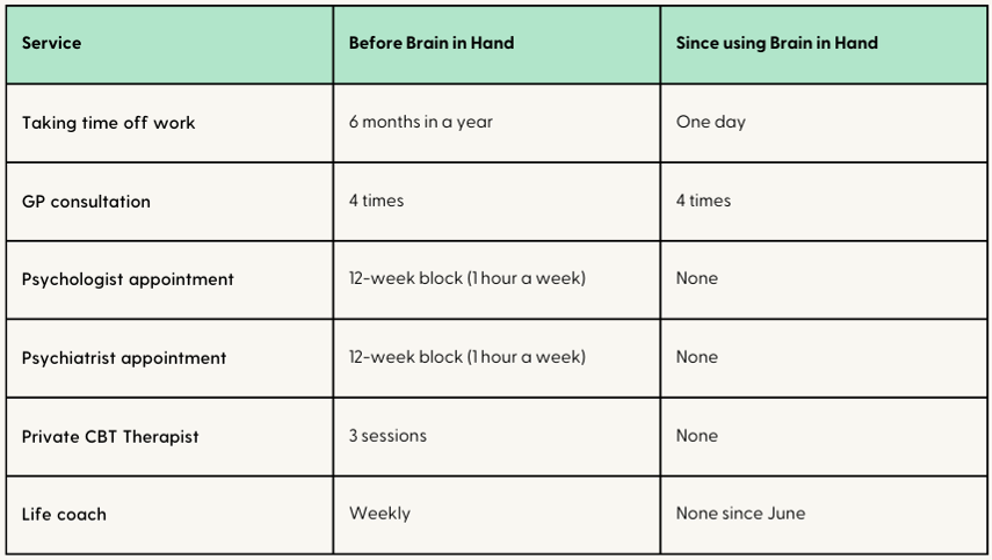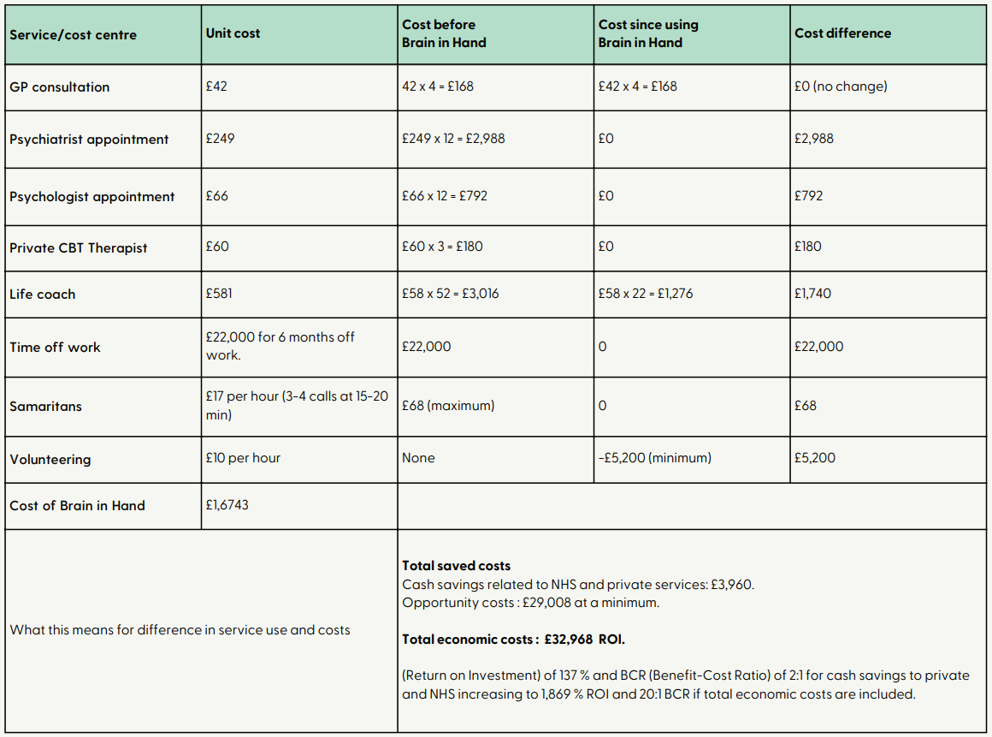Brain in Hand helps Jack in work

Jack works in the civil service. Before this, he served 23 years in the British Army. After serving in Afghanistan, he was diagnosed with PTSD and anxiety and subsequently discharged.
Upon leaving the army, Jack found it difficult to access mental health support. He faced long waiting lists for therapy. However, he received helpful block therapy treatments and invaluable support from a charity focused on veterans and emergency service workers.
Jack took a 6-month leave from work because of mental health struggles. When he returned, Brain in Hand helped make the transition smoother. The process felt less stressful, and he believes it allowed him to ease back into work more quickly. Since his return, Jack has become a leader in staff welfare and mental health initiatives at his workplace.
"I definitely would've had quite a long delay in coming back to work. After that first experience of coming back without Brain in Hand, I'd be on the edge of crumbling all the time, not feeling good, always worried about getting upset."
"It would've hindered my return to work for a substantial period. I would've had to take things a lot slower coming back than I did, so [Brain in Hand] has saved time there."
"The amount of time I would've spent in a worse place means I wouldn't have had that quick recovery."
Jack began using Brain in Hand in January 2023 through his workplace. Since then, he feels he can manage his mental health better because he has the right tools. For example, the app stores his calming mantra and reminds him to focus on his breathing when he faces stressful situations.
"Brain in Hand has helped me prepare my life better so I'm more organized when it comes to my mental health."
"I freely tell people I'm going to be there 10 minutes early [to meetings] to scope it out, and everyone is fine with it."
"I'm not shy about my mental health; I'll tell people that I've got issues. I don't feel like my mental health is improved, but I feel better with people knowing I've got limitations rather than waiting until things go wrong."
Jack finds the traffic light system in Brain in Hand very helpful. It allows him to understand his feelings and manage his own reactions. Changes in his life can be difficult, and he plans to use Brain in Hand for his upcoming move. The app will provide him with coping strategies and help him prepare for potential challenges during the process.
“Things I've learnt with Brain in Hand include doing things differently, taking that breath, and giving myself time. At the minute, I mainly use the traffic lights. But when it comes to moving, I'll use it a lot more to help.
At the start, it helps you manage your day and get through it – even with little things that you would never normally think about. You've put the information in there on how to react when you are calm. It's you that's telling you what to do, not just some program saying, 'do this, do that'. It's you, telling you what to do because you know best.”
The response service gives Jack a sense of security. He's successfully used it in the past to de-escalate a challenging situation. Even though he doesn't need it frequently, the service empowers him to step outside of his comfort zone.
“It's always good to know you've got that red button, it's a comfort blanket, I feel confident going places because if anything happens, I can press the red button and I wouldn’t have that confidence if I didn't have it.”
Jack believes Brain in Hand makes a positive difference in both his work and home life. He thinks it has the potential to help many others like him.
“I wouldn’t feel as happy. My mood would start to go down, I'd just be in a worse place, it would, it's a way of managing my life both at work and at home that gives me the opportunity to be a happier person and I think without it I wouldn’t have that opportunity. I'd be more miserable; I'd have a dark view on things.
BiH has a massive potential for serving people who are too proud to get help, it just means that they are identifying they've got a problem and then how to manage it... it might give them space to say, "I need some professional help". I've got lots of friends who say they're fine but they're not fine.”
What the findings tell us about averted costs and improved wellbeing
Since Jack’s able to better manage his mental health, there have been some changes in the way he accesses different services and how he can use his time (Table 1) and we can use these to establish cost savings (Table 2).
Table 1: Time off work and service use before Brain in Hand and since using Brain in Hand

Brain in Hand has helped Jack stay in work and develop strategies to manage his anxiety, both at work and in his personal life. He's happier now, which highlights the tool's effectiveness for those with mental health challenges. Jack's improved attendance is a major success–before Brain in Hand, he took longer absences, including one that cost his employer £22,000.
Jack had a block of 12 NHS high intensity CBT sessions where he would see a psychologist and a psychiatrist just until he started using Brain in Hand in January 2023.
At current NHS rates, this represents a financial cost of £3,780. He had paid privately for 3 sessions of therapy himself before the support from the NHS caught up at an estimated cost of £180. He no longer receives professional treatment for his mental health now.
"I've not really engaged with mental health services because I've not really needed to because I'm in a much better place, partly due to Brain in Hand."
Jack used to receive support from a life coach who worked for a charity that helps former military and emergency services personnel. The charity offered Jack free alternative therapies, like crystals and aromatherapy, to assist with his mental health. He worked with them for two and a half years.
Though Jack stopped formal sessions in June, he still stays in touch with his life coach. This interview was conducted in November 2023, and in the time since he stopped receiving regular sessions, Jack has potentially saved the charity the costs associated with approximately 30 sessions–a value of £1,740.
Importantly, even though the service was free to Jack, it represents an opportunity cost. The time the life coach spent with him potentially limited their capacity to help others.
Jack had contacted Samaritans a few times for help with mental health crises before using Brain in Hand, but he didn't find their support particularly helpful.
He explains, "The standard is to ring Samaritans, but I don't find them that useful. Some are really good but others aren't. They don't feel anything."
Jack called them 3-4 times, with each call lasting 15-20 minutes. If we consider the time spent as equivalent to a standard therapist's session, this suggests an opportunity cost of £68.
After his positive experience with Brain in Hand, Jack decided to further support his mental wellbeing by volunteering at two charity shops. He dedicates 10-15 hours a week to this, helping him stay active and manage his social anxiety.
While this is an invaluable commitment, it's worth noting that based on a minimum wage of £10 per hour, Jack's volunteering represents an opportunity cost of between £5,200 and £7,800 annually.
Table 2: Costs savings breakdown by service use and other economic areas

From the changes that Jack has described, we are able to consider a number of cost savings since using Brain in Hand from reduction in using services and economic benefits related to employment and volunteering (see Table 2).
At a minimum, the cost savings per year for accessing mental health support (psychologist, psychiatrist and private CBT) was £3,960 (ROI of 137% and BCR of 2:1), with a potential ROI of 1,869% (20:1 BCR) if we include the added benefits of employment and the opportunity costs of the time provided by a job coach and Samaritans, and the contribution Jack now makes through his volunteering.